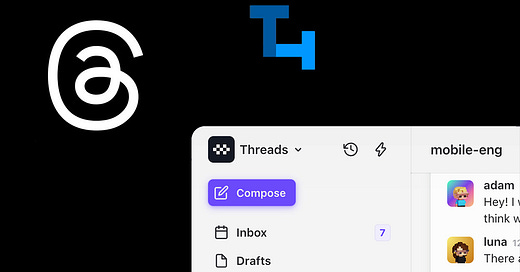Briefing: Spotify CEO's $60m body scans, Threads and Penpots
Plus: a new tool for SaaS pricing and Google Calendar gets shared events
Hi product people👋,
After the UK’s Competition and Markets Authority (CMA) provisionally ruled that Adobe’s proposed takeover of Figma could lead to a ‘substantial lessening of competition’ in the design tools market, there is a risk that the deal may get blocked. But until we know for certain, there’s a new open sourced Figma alternative worth knowing about. Penpot is a free Figma-like design tool and can even be self hosted if you’re that way inclined.
Speaking of product alternatives, Meta has officially launched its Twitter alternative, Threads. With over 10 million users already signed up, Meta’s Chief Product Officer Chris Cox previously explained that the product would cater to folks who want a text-based social platform that’s ‘sanely run’. Despite a massive install base of over 2 billion+ users, Meta has historically struggled to get spin off products to work. Threads originally launched back in 2019 but closed 2 years later and more recently the company shut down Instagram’s IGTV and Live Shopping App.
Spare a thought for this (excellent) Slack competitor also named Threads who have had to make it clear this week that they’re in no way affiliated with the new product. I wonder how much Meta will offer to acquire that threads.com domain.
Meanwhile, Spotify’s CEO has announced a fresh round of funding for his other company you might not have heard about. Neko is a body scanning start up that uses a proprietary combination of 3D scanning and machine learning to perform diagnostic tests that detect diseases such as cardiovascular disorders and skin cancers. After raising an additional $60 million, Neko’s CEO says the future of healthcare lies in prevention of disease and early detection - and not in adding more funding to existing healthcare models.
Other products worth checking out this week include this interesting take on document collaboration. Take Turns is designed to end the disaster that is collaborative document editing and instead neatly packages it into a simpler experience where you ‘take turns’ to edit documents, one turn at a time. Perfect for dealing with internal stakeholders or third parties.
Finally, if you’re struggling to get into the swing of things and engage your brain during the summer months, this collection of mental models and frameworks should help.
Enjoy the rest of your week!
Rich at DOP
Essential reads for product teams
The latest from Department of Product
New this week:
📈 Monetization Strategies Part 2 - How Discord makes money and ideas on the future of product-led monetization
🧠 The Knowledge Series #2 - SQL explained: how to write basic SQL queries
(Department of Product)
Product strategy - The 7 types of unfair advantages
A lot of people equate unfair advantages to competitive advantages. While related, they are not the same. (
)Tools you can use
SaaS pricing model explorer - explore and get inspiration from 1000+ pricing models
Balance - a time tracking app to help with work life balance
WorkViz - visualise team productivity and get automated daily worklogs from team members
Micro Analytics - a free, privacy-focused alternative to Google Analytics
UX - How to design the perfect ‘back’ button
Users expect the “Back” button to take them back to what they perceived to be their previous page. The notion of perception is the key factor here, since there’s often a difference between what is technically a new page and what users perceive to be a new page — which can create discrepancies between where the user expects the “Back” button to take them and where it actually takes them. (Baymard Institute)
Talks worth watching- GitHub’s CEO on engineering productivity
Technical explainers - What exactly is Low Code?
Low-code is a visual development approach that allows users to create applications and software with less code, using drag-and-drop interfaces and pre-built templates (
)New product features, launches and announcements this week
Google Calendar has launched a new feature which allows users to share events and invite large numbers of people at once - without having to add a contact’s email address.
Peloton is introducing new gamification features to boost engagement called Lanebreak. Users can switch lanes using the resistance knob and listen to remixes of David Bowie. Chief Product Officer Tom Cortese say the new feature has been informed by user feedback.
Microsoft Teams is rolling out a new feature that will filter out profanities. The feature will filter out offensive swear words from live captions and the transcript.
DoorDash has introduced a bunch of new features, including a new feature for delivery workers called ‘Earn by Time’ which guarantees an hourly rate of pay plus 100% of tips. For users, a freshly designed universal search bar will allow users to search across grocery and restaurants.
Proton has launched a new password management product called Proton Pass. The new product is an open-sourced alternative to 1Password which has recently been criticised for bugs introduced since the launch of a new version last year.
📈 Product insights and trends to stay informed
Just 6% of Microsoft’s revenue is derived from Search advertising vs. 57% of Google’s, neatly demonstrating why Microsoft is able to take risks with genAI-powered Bing results.
Snapchat+ now has over 4 million paid subscribers to its micro subscription - just one year after launching, proving that there is a market for social media subscriptions after all - so long as they’re sensibly implemented.
Up to 30% of online reviews are fake - and US regulators are plotting a clampdown that would ban paying for reviews.
Gen-Z is addicted to virality - and pop stars are the target. The latest TikTok trend sees concertgoers throw random objects at pop stars to create viral videos. Adele reacted to the trend by issuing a stark warning to her audience.
92.4% of finance apps were susceptible to data extraction by malicious screen readers according to a new study.
Tailwind is the fastest growing CSS framework used by developers, but it’s still only used by ~0.1% of websites.
Tech leadership updates
Twitter’s CEO has warned that the company needs to be ready for ‘hand to hand’ combat to bring back advertisers who fled the platform following Musk’s acquisition.
Yahoo’s CEO says the company is now profitable and plans to return to public markets.
OpenAI’s CEO Sam Altman is under fire after a new lawsuit alleges the company stole personal data from “millions of Americans” to train ChatGPT.

If you enjoyed this week’s Department of Product Weekly Briefing, hit the like button below ❤️ - I’d really appreciate it!




